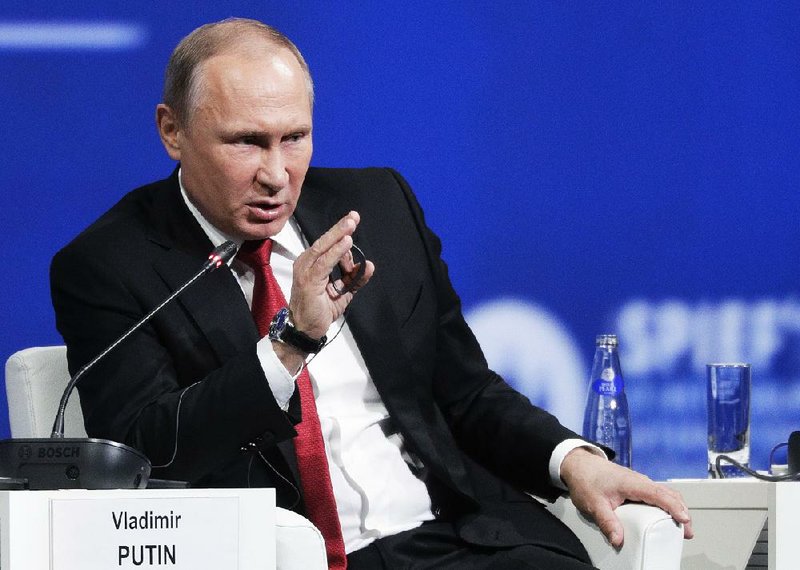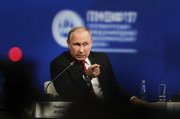ST. PETERSBURG, Russia -- Russian President Vladimir Putin denied Friday that Moscow had colluded with members of Donald Trump's campaign team before the new administration took office, and said U.S. allegations that Russia tipped the 2016 presidential election on behalf of Trump "reminds me of anti-Semitism and blaming the Jews."
Putin, in remarks that projected ridicule, sarcasm and exasperation, denied that Russian officials had discussed sanctions in meetings with Trump's aides and said no agreements on the possibility of lifting the sanctions imposed on Russia have been reached with the United States.
"I never even knew about these meetings," Putin said in response to questions from NBC anchor Megyn Kelly at an economic forum in St. Petersburg. The Kremlin leader said Democrats, having lost the election, were trying to put the blame on Russia to cover for their own campaign failures.
"It reminds me of anti-Semitism," Putin said, his voice rising. "A stupid man who can't do anything right would blame everything on the Jews."
[PRESIDENT TRUMP: Timeline, appointments, executive orders + guide to actions in first 100 days]
The Russian president dismissed the conclusions of the U.S. intelligence community that Russia meddled on behalf of Trump, saying that he had read the report and found nothing but "speculation and conclusions based on speculation."
Pressed by Kelly to explain the Russian "fingerprints" described by the combined intelligence agencies' declassified report, Putin said the IP addresses the report attributed to Russian hackers could have been rigged by anyone to blame Russia.
"What fingerprints?" Putin said. "Hoof prints? Horn prints? Experts in information technology can invent anything."
Challenged by Kelly to explain what U.S. intelligence referred to as a disinformation campaign intended to undermine faith in the elections, Putin pointed to leaked emails that showed the Democratic National Committee's favoritism for Hillary Clinton over Bernie Sanders, which led to the resignation of the committee's chairman, Debbie Wasserman Schultz.
Instead of apologizing, Putin said, Democrats "say it's not our fault, it was the Russians."
He said the allegations of Russian hacking into the Democratic National Committee overshadow the fact that the leaked emails were genuine and revealed unpleasant truths.
"It was true information. Was it so important who leaked it?" he said. "It was necessary to apologize to the people and vow not to make such mistakes in the future."
He insisted that Trump won thanks to his skills, not Russian interference.
"The problem isn't us, the problem is inside U.S. politics," he said. "Trump's team was more efficient during the election campaign."
Putin and other top Russian officials have routinely dismissed as "Russophobia" all U.S. claims about Moscow's involvement in the election and blame the furor over Russian interference for what both sides characterize as the low point in their post-Soviet relations. The Kremlin has sought to ridicule Americans for what Putin and his aides have dismissed as a witch hunt.
Meetings with Russians
Putin also sounded off Friday about U.S. scrutiny of meetings between Trump's team and Russia's ambassador to the United States. The contacts have become the focus of an FBI investigation into possible collusion between Moscow and Trump's aides that has most recently centered on Jared Kushner, the president's son-in-law.
Kushner met with the ambassador, Sergey Kislyak, in early December and suggested establishing a secure communications line between the Kremlin and Trump officials at a Russian diplomatic facility, according to U.S. officials who reviewed intelligence reports describing Kislyak's account.
Kushner then held a secret meeting with Sergei Gorkov, head of Russia's Kremlin-connected development bank, a meeting the White House says was one of many diplomatic encounters Kushner, now a presidential adviser, held in the weeks before Trump's inauguration.
Gorkov, chairman of Vnesheconombank, refused to comment on the meetings when confronted Friday and referred reporters to the bank's March statement that the meeting was conducted with Kushner in his role as the head of his family's real estate business.
Putin expressed scorn at the focus on Kislyak's contacts with Trump's team, saying it was normal for a diplomat to establish contacts.
"What else is the ambassador supposed to do?" Putin said. "He's paid for holding meetings, discussing current affairs. Have you lost your mind?
Asked specifically if Kislyak had agreed with members of Trump's team on lifting anti-Russian sanctions, Putin denied that any such deal was made.
"My answer is no," he said. "There were no agreements. We didn't even come close to that. We didn't even start negotiations."
Asked separately about Trump's decision to withdraw the United States from the Paris climate agreement, Putin stopped short of condemning Trump.
The climate deal cannot work without the United States, he said, but the accord is not scheduled to go into effect until 2021, which left hope for a compromise that would bring the United States back to the deal.
Switching to English, Putin added: "Don't worry, be happy."
He joked that Trump's move made him a convenient person to blame for any spell of bad weather, including wet snow in Moscow on Friday, an extremely rare occurrence in the summer.
"Now we can dump it all on him and American imperialism," Putin said.
Chemical Attack
On another front, Putin insisted that the Syrian leader didn't use chemical weapons against Syrians, saying the recent attack that killed scores of civilians was a "provocation" against President Bashar Assad.
The chemical attack in April in northern Syria killed at least 90 people, including many children, and has largely been blamed on Assad's forces. It was followed by an unprecedented U.S. strike on a Syrian air base from which aircraft suspected of being involved in the chemical raid took off.
"We are absolutely convinced that it was a provocation. Assad didn't use the weapons," Putin said. "It was done by people who wanted to blame him for that."
The attack in the opposition-held town of Khan Sheikhoun caused an international uproar as images of the aftermath, including quivering children dying on camera, were widely broadcast.
Russia, one of Assad's closest allies, and the Syrian government have repeatedly denied using chemical weapons. After an equally fatal chemical attack in 2013, Syria agreed to destroy its chemical weapons under a deal brokered by Russia and the United States and declared a 1,300-ton chemical arsenal when it joined the Organization for the Prohibition of Chemical Weapons.
That stockpile has been destroyed, but the organization continues to question whether Syria declared everything in its chemical weapon program.
Putin criticized the international monitors for dragging their feet on visiting the town that came under attack citing safety concerns, adding sarcastically that the West claimed the area was controlled by moderate opposition fighters so it shouldn't have been dangerous to visit.
Last week, a team from the international chemical weapons watchdog found exposure "to sarin or a sarin-like substance" in samples it examined from the April 4 attack and said it is planning a trip to visit Khan Sheikhoun in Idlib province in northern Syria.
Fact-finding teams from the Organization for the Prohibition of Chemical Weapons have been investigating the alleged use of chemical weapons in Syria but aren't mandated to determine responsibility for attacks. That has been left to a joint U.N.-weapons monitor investigative body.
Putin said Assad is not without mistakes, but investigation into his adversaries' actions must also be pursued.
"Has Assad made mistakes? Yes, quite a few. And what about people confronting him? Are they angels? Who are they who kill people there, execute children? Are they people who we should support?" he said.
Putin said he wanted to avoid Syria meeting the same fate as Somalia or Libya, where militias rule.
"Primarily, we are defending not Assad but the Syrian statehood. We don't want to see the situation there become like it is in Libya, Somalia or Afghanistan," he said.
Leaks by Snowden
In separate series of interviews, conducted by filmmaker Oliver Stone, Putin addressed the United States' surveillance program exposed by former U.S. intelligence contractor Edward Snowden.
"Snowden is not a traitor," Putin said in an excerpt of the interviews posted by Showtime. "He did not betray the interests of his country, nor did he transfer any information to any other country."
While he agreed with Snowden that the National Security Agency went too far in its surveillance program, Putin said he shouldn't have leaked the information. In 2013, Snowden fled to Moscow from Hong Kong after exposing clandestine NSA programs that collect phone and Internet data.
Russia's harboring of Snowden, who is wanted in America for revealing intelligence secrets, sparked a major confrontation with the U.S. The Foreign Ministry said in January that Russia had extended Snowden's right to live in the country for "a couple more years." The former NSA contractor's asylum that ended his 39-day stay in the transit area of Moscow's Sheremetyevo airport had been due to expire this year.
Asked if Snowden did the right thing, Putin said: "If he didn't like anything at his work, he should simply have resigned, but he went further. That's his right."
Putin, a former KGB colonel, agreed that Snowden's predicament was similar to the dilemma he faced as the Soviet Union was collapsing more than a quarter-century ago, when Communist Party loyalists staged their putsch in August 1991.
"I had not given it thought, but I think yes," Putin said. "I resigned because I didn't agree with the actions undertaken by the government."
The Stone interviews will be broadcast starting June 12.
Information for this article was contributed by David Filipov of The Washington Post; by Ian Phillips, Vladimir Isachenkov and Sarah El Deeb of The Associated Press; and by Henry Meyer of Bloomberg News.
A Section on 06/03/2017

